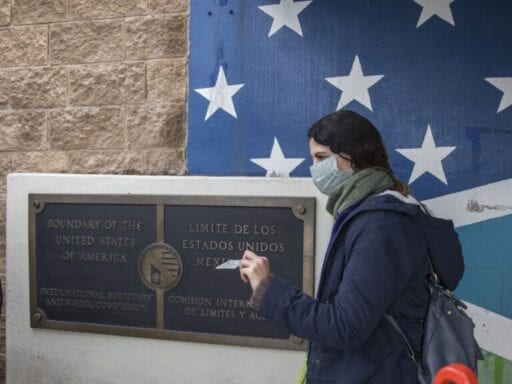It’s unlikely to be that helpful in curbing America’s coronavirus outbreak.
President Donald Trump on Friday announced the United States and Mexico have agreed to temporarily restrict nonessential travel across their shared border in an effort to stop the spread of the novel coronavirus.
According to top officials from both countries, commercial goods transported on trains and trucks won’t be affected nor will citizens or legal residents; people with legal work permits, people who are considered “essential”; or people traveling for medical education reasons.
These restrictions will begin on Saturday at midnight and will last “as long as they need [to last] to protect the American people,” Secretary of State Mike Pompeo said during a Friday press conference.
“The outbreak on our southern border would likely increase the strain on health systems in our border communities, taking away important and life-saving resources from American citizens,” acting Homeland Security Secretary Chad Wolf told reporters at the press conference.
Wolf also said that migrants trying to enter the US from Mexico and Canada illegally will be “immediately” returned by US Border Patrol.
These measures are consistent with the Trump administration’s emphasis on travel restrictions during the coronavirus outbreak. On Wednesday, the president announced that the US-Canada border would be closing. And on Thursday, the State Department cautioned American citizens not to travel abroad and called on US citizens around the world to come home as soon as they can or prepare to remain where there are for an indefinite period of time.
In that sense, then, experts aren’t too worried about this announcement. “As long as the shutdown doesn’t mean for trade, it’s probably okay,” Roberta Jacobson, who served as the US ambassador to Mexico during the Obama administration, told me.
But there are still two major issues with this decision: 1) it won’t really affect America’s coronavirus outbreak and 2) it might bolster Trump’s efforts to restrict migration from the southern border.
The possible problems with the US-Mexico border decision
First, Covid-19, the formal name of the disease caused by the novel coronavirus, is already in the US and racking communities across the country. Keeping other people out might help at the margins, but the real challenge facing America is dealing with the thousands of sick people — and likely thousands more to come — here at home.
“Border closures have not stopped the spread of this virus or prevented it from becoming a pandemic,” Jennifer Nuzzo, a senior scholar at the Johns Hopkins Center for Health Security, told Vox’s Nicole Narea last week. “Now that we have local transmission within the United States, looking outward to control the virus makes even less sense.”
Second, Trump has made curbing migration from Mexico into the United States a central pillar of his presidency. There’s a chance, then, that he and his administration are using the crisis as a potential excuse to further restrict travel across the southern border.
There’s some evidence for this. As of Wednesday, the US will no longer process H2A visas, which permit foreigners to take temporary agricultural jobs in America. That is a major concern for Jacobson.
“This is happening just as the US goes into peak growing season and impacts the supply of produce,” she told me. “I understand the US Farm Bureau and other grower organizations are very upset.” However, there are some indications the Trump administration may fix the looming labor shortfall problem.
So while the closure will certainly disrupt the lives of many who rely on crossing the border regularly, other problems are only likely to mount.
Author: Alex Ward
Read More



